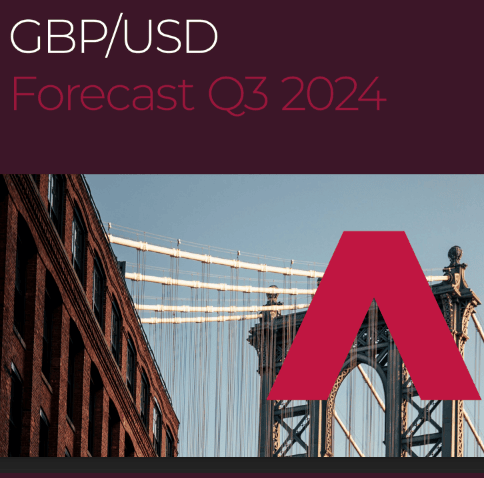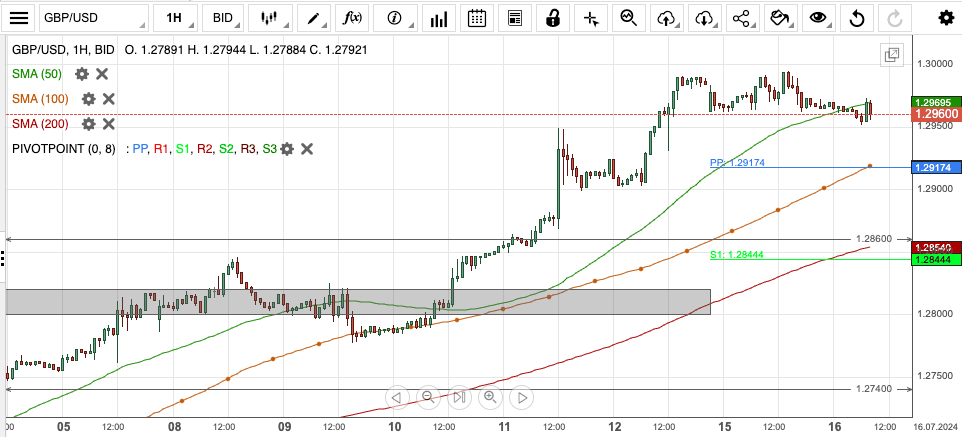GBP/USD Retreats from 1.30 Barrier Following U.S. Retail Sales Surprise
- Written by: Sam Coventry

Image © Adobe Images
The Pound to Dollar exchange rate's advance has paused just short of the 1.30 barrier following the release of above-consensus retail sales figures. Profit-taking can extend if tomorrow's UK inflation figures undershoot.
Pound Sterling has fallen from recent highs against the U.S. Dollar following an above-consensus U.S. retail sales report.
GBP/USD is down 0.20% on the day at 1.2940 after retail sales printed a flat 0% month-on-month in June whereas the expectation was for a -0.3% reading. Core retail sales rose by 0.4%. This exceeded estimates for 0.1% and represents a USD-supportive surprise.
"Today’s data is yet another reminder that you can never count out the American consumer," says Ali Jaffery, an economist at CIBC Capital Markets.
Pound Sterling is 2.50% firmer against the Dollar in July and is on the cusp of levels last attained this time one year ago, helped by rising expectations for a September rate cut. It will likely take a run of convincingly strong data to turn the tide of a September cut.
"Does the strength in consumption shift the balance of evidence for the Fed and a signal that demand in the economy could be heating up? We think not. The accumulation of evidence showing inflation and the labor market cooling will be more than enough to convince the Fed for a September cut," says CIBC's Jaffery.
Data shows the exchange rate's rally stalled a mere six pips ahead of the 1.30 level, which would be consistent with sell orders being layered ahead of the big marker. (Learn about pips and calculate potential exposure using a forex pips calculator).
The July 2023 high is located at 1.3142, but the Pound was unable to hold such levels for very long. In fact, what followed this peak was a three-month-long slide that took the pair back down to 1.2037. "1.3000 is acting as resistance and keeping the GBP/USD down," says a technical analysis note from Dukaskopy
Track GBP/USD with your custom alerts; find out more here.
Will we see a repeat of 2023's fall, or will the Pound's rally have the stamina to hold and build on recent gains? For now, analysts think any setbacks are likely to be shallow.
Dukaskopy analysis shows that the approaching 50-hour simple moving average might provide the needed support for the rate to move above 1.3000. "Above the 1.3000, resistance might be encountered in the weekly R1 at 1.3058 and the 1.3050 level."
Looking ahead, the next moves in GBP/USD will likely depend on UK data.
Risks to Pound Sterling are also asymmetrical: following a solid run, we note Pound-Dollar and other GBP-based exchange rates are now reading as overbought as markets see less chance of an interest rate cut at the Bank of England this August than was the case at the start of July.
GBP to USD Transfer Savings Calculator
How much are you sending from pounds to dollars?
Your potential USD savings on this GBP transfer:
$1,702
By using specialist providers vs high street banks
Kenneth Broux, a strategist at Société Générale, says positioning amongst major market participants, notably hedge funds, has been building notably. This could leave the Pound vulnerable to any setbacks from this week's data.
"The long base expanded again last week to 37% of Open Interest. Admittedly, this means GBP/USD is vulnerable to profit-taking," says Broux.
Should UK inflation undershoot expectations, the odds of an August 01 cut will build again, taking some more heat out of the Pound's rally. For now, we expect weakness to be relatively contained and consistent with an unwinding of overbought conditions.
Services inflation is expected to read at 5.6% and headline CPI inflation is forecast to read at 2.0%. Any undershoot would raise the odds of an August 01 rate cut and send an overbought Pound-Dollar sharply lower.
Analysts at Oxford Economics reckon the headline CPI inflation print will be 1.8%, which would represent a decent undershoot and prompt a selloff in the Pound.
"Considering the GBP has been the best performing G-10 currency QTD, we think it remains prone to a larger correction if CPI print comes in lower than expectations," says Daragh Maher, Head of FX Strategy at HSBC.
Regarding the wage numbers on Thursday, the expectation is for average weekly earnings to have increased by 5.8% over the year to June. Anything below here would result in GBP selling.






